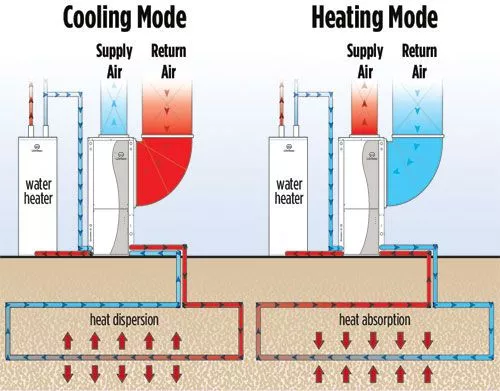Consumers have so many options nowadays when it comes to heating & cooling systems. One alternative is right underneath their feet – making the most of earth’s unceasing concealed temperature approximately thirty feet below the surface.
Also known as ground-source heat pumps, geothermal heat pumps (GHPs) can cool, heat and even source hot water to your home by conveying heat to or from the ground. Consumers have been taking advantage of this technology for over fifty years as it reduces utility bills up to 65 percent in comparison to conventional HVAC systems.
So, if you are planning to install a geothermal heating pump for your home here are few things you’d like to know about this technology.

GHPs can be used regardless of the climate:
Regardless of the climatic condition – hot or cold – GHPs can operate due to the earth’s steady underground temperature. In fact, millions of geothermal heat pump units are already heating & cooling businesses and homes across the globe.
Open & closed loop systems:
Consumers get so many choices when it comes to choosing a geothermal heat pump unit, including closed or open-loop designs. Most of the GHPs in the US make use of ground heat exchangers for circulating fluid via a closed-loop design. The pipes are usually made from plastic tubing & are concealed vertically or horizontally. The layout of a ground heat exchanger system can differ depending upon the soil conditions, climate, land accessibility, ground water availability, and local installation charges at the site.
GHPs are meant to last long:
GHPs are meant to last long & have really long lifetime. You can expect to get about 25 years out of GHP indoor components and more than fifty years for ground loops.
Though installation costs can be very expensive, GHPs are about 65 percent more efficient compared to conventional HVAC systems and pay themselves back gradually in energy savings – usually inside ten years.
GHP decrease high electricity requirements & carbon emissions:
As stated earlier, geothermal heat pumps are more energy efficient in comparison to conventional HVAC units and can help in lightening the load in the electric grid, particularly during summer when the demand for electricity is in its peak. Moreover, they can help in reducing carbon emissions credits to their high efficiency.
Not sure whether you can install your own geothermal system? Not to worry! 123 Zero Energy supplies Geothermal DIY kits which are available with everything you require. Our geothermal kits are available in both ground loops and well loops. For more information visit our site now or call us on 1-800-317-9054.
No comments:
Post a Comment